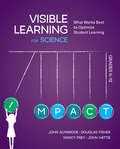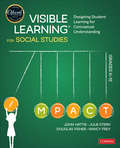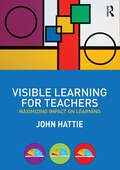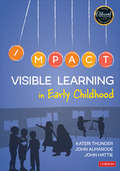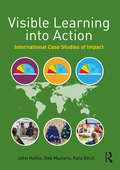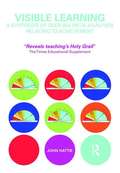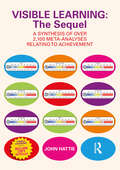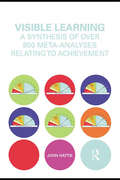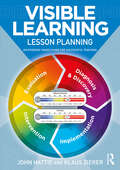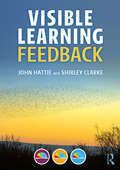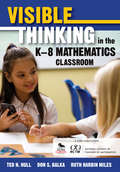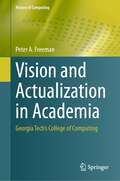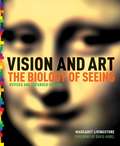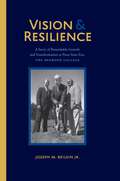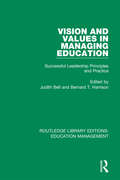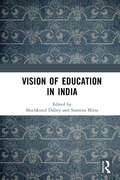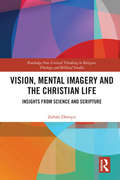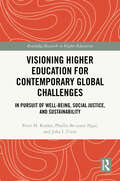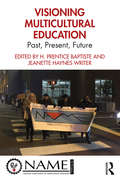- Table View
- List View
Visible Learning for Science, Grades K-12: What Works Best to Optimize Student Learning
by Douglas Fisher John Hattie Dr Nancy Frey John T. AlmarodeInquiry, laboratory, project-based learning, discovery learning—which science instructional approach is most effective? In Visible Learning for Science, the authors reveal that it’s not which strategy, but when, and plot a vital K-12 framework for choosing the right approach at the right time, depending on where students are within the three phases of learning: surface, deep, and transfer. Synthesizing state-of-the-art science instruction and assessment with John Hattie’s cornerstone educational research, this book empowers you to plan, develop, and implement high-impact instruction at each phase so all students demonstrate more than a year’s worth of learning for every year in school.
Visible Learning for Social Studies, Grades K-12: Designing Student Learning for Conceptual Understanding (Corwin Teaching Essentials)
by Douglas Fisher John Hattie Julie Stern Dr. Nancy FreyHelp students move from surface-level learning to the transfer of understanding. How do social studies teachers maximize instruction to ensure students are prepared for an informed civic life? This book shows how the field is more than simply memorizing dates and facts—it encapsulates the skillful ability to conduct investigations, analyze sources, place events in historical context, and synthesize divergent points of view. Best practices for applying visible learning are presented through: · A scaffolded approach including surface-level learning, deep learning, and transfer of learning · Examples of strategies, lessons, and activities best suited for each level of learning · Planning tools, rubrics, and templates to guide instruction
Visible Learning for Social Studies, Grades K-12: Designing Student Learning for Conceptual Understanding (Corwin Teaching Essentials)
by Douglas Fisher John Hattie Julie Stern Dr. Nancy FreyHelp students move from surface-level learning to the transfer of understanding. How do social studies teachers maximize instruction to ensure students are prepared for an informed civic life? This book shows how the field is more than simply memorizing dates and facts—it encapsulates the skillful ability to conduct investigations, analyze sources, place events in historical context, and synthesize divergent points of view. Best practices for applying visible learning are presented through: · A scaffolded approach including surface-level learning, deep learning, and transfer of learning · Examples of strategies, lessons, and activities best suited for each level of learning · Planning tools, rubrics, and templates to guide instruction
Visible Learning for Teachers: Maximizing Impact on Learning
by John HattieIn November 2008, John Hattie’s ground-breaking book Visible Learning synthesised the results of more than fifteen years research involving millions of students and represented the biggest ever collection of evidence-based research into what actually works in schools to improve learning. Visible Learning for Teachers takes the next step and brings those ground breaking concepts to a completely new audience. Written for students, pre-service and in-service teachers, it explains how to apply the principles of Visible Learning to any classroom anywhere in the world. The author offers concise and user-friendly summaries of the most successful interventions and offers practical step-by-step guidance to the successful implementation of visible learning and visible teaching in the classroom. This book: links the biggest ever research project on teaching strategies to practical classroom implementation champions both teacher and student perspectives and contains step by step guidance including lesson preparation, interpreting learning and feedback during the lesson and post lesson follow up offers checklists, exercises, case studies and best practice scenarios to assist in raising achievement includes whole school checklists and advice for school leaders on facilitating visible learning in their institution now includes additional meta-analyses bringing the total cited within the research to over 900 comprehensively covers numerous areas of learning activity including pupil motivation, curriculum, meta-cognitive strategies, behaviour, teaching strategies, and classroom management. Visible Learning for Teachers is a must read for any student or teacher who wants an evidence based answer to the question; ‘how do we maximise achievement in our schools?’
Visible Learning for Teachers: Maximizing Impact on Learning
by John HattieIn November 2008, John Hattie’s ground-breaking book Visible Learning synthesised the results of more than fifteen years research involving millions of students and represented the biggest ever collection of evidence-based research into what actually works in schools to improve learning.Visible Learning for Teachers takes the next step and brings those ground breaking concepts to a completely new audience. Written for students, pre-service and in-service teachers, it explains how to apply the principles of Visible Learning to any classroom anywhere in the world. The author offers concise and user-friendly summaries of the most successful interventions and offers practical step-by-step guidance to the successful implementation of visible learning and visible teaching in the classroom.This book: links the biggest ever research project on teaching strategies to practical classroom implementation champions both teacher and student perspectives and contains step by step guidance including lesson preparation, interpreting learning and feedback during the lesson and post lesson follow up offers checklists, exercises, case studies and best practice scenarios to assist in raising achievement includes whole school checklists and advice for school leaders on facilitating visible learning in their institution now includes additional meta-analyses bringing the total cited within the research to over 900 comprehensively covers numerous areas of learning activity including pupil motivation, curriculum, meta-cognitive strategies, behaviour, teaching strategies, and classroom management Visible Learning for Teachers is a must read for any student or teacher who wants an evidence based answer to the question; ‘how do we maximise achievement in our schools?’
Visible Learning in Early Childhood
by John Hattie John T. Almarode Kateri ThunderMake learning visible in the early years Early childhood is a uniquely sensitive time, when young learners are rapidly developing across multiple domains, including language and literacy, mathematics, and motor skills. Knowing which teaching strategies work best and when can have a significant impact on a child’s development and future success. Visible Learning in Early Childhood investigates the critical years between ages 3 and 6 and, backed by evidence from the Visible Learning® research, explores seven core strategies for learning success: working together as evaluators, setting high expectations, measuring learning with explicit success criteria, establishing developmentally appropriate levels of learning, viewing mistakes as opportunities, continually seeking feedback, and balancing surface, deep, and transfer learning. The authors unpack the symbiotic relationship between these seven tenets through Authentic examples of diverse learners and settings Voices of master teachers from the US, UK, and Australia Multiple assessment and differentiation strategies Multidisciplinary approaches depicting mathematics, literacy, art and music, social-emotional learning, and more Using the Visible Learning research, teachers partner with children to encourage high expectations, developmentally appropriate practices, the right level of challenge, and a focus on explicit success criteria. Get started today and watch your young learners thrive!
Visible Learning in Early Childhood
by John Hattie John T. Almarode Kateri ThunderMake learning visible in the early years Early childhood is a uniquely sensitive time, when young learners are rapidly developing across multiple domains, including language and literacy, mathematics, and motor skills. Knowing which teaching strategies work best and when can have a significant impact on a child’s development and future success. Visible Learning in Early Childhood investigates the critical years between ages 3 and 6 and, backed by evidence from the Visible Learning® research, explores seven core strategies for learning success: working together as evaluators, setting high expectations, measuring learning with explicit success criteria, establishing developmentally appropriate levels of learning, viewing mistakes as opportunities, continually seeking feedback, and balancing surface, deep, and transfer learning. The authors unpack the symbiotic relationship between these seven tenets through Authentic examples of diverse learners and settings Voices of master teachers from the US, UK, and Australia Multiple assessment and differentiation strategies Multidisciplinary approaches depicting mathematics, literacy, art and music, social-emotional learning, and more Using the Visible Learning research, teachers partner with children to encourage high expectations, developmentally appropriate practices, the right level of challenge, and a focus on explicit success criteria. Get started today and watch your young learners thrive!
Visible Learning into Action: International Case Studies of Impact
by John Hattie Deb Masters Kate BirchRecently at the Visible Learning Conference, Professor John Hattie stood up in his opening address and said, "I’m looking at you all and thinking ‘What if I got this wrong?’" I feel the same way when educators ask to visit and I always end up in the same place – that Keilor Views is a living, breathing example that he didn’t. -- Charles Branciforte, Principal of Keilor Views Primary School, Melbourne, Australia Visible Learning into Action takes the next step in the evolving Visible Learning story. It translates one of the biggest and most critically acclaimed education research projects ever undertaken into case studies of actual success stories, implementing John Hattie’s ideas in the classrooms of schools all around the world. The evidenced case studies presented in this book describe the Visible Learning journeys of fifteen schools from Australia, USA, Hong Kong, UK, Sweden, New Zealand and Norway and are representative of the VL international community of schools in their quest to ensure all of their students exceed their potential for academic success. Each school’s story will inform and inspire, bringing to life the discussions, actions and reflections from leaders, teachers, students and families. This book features extensive, interactive appendices containing study guide questions to encourage critical thinking, annotated endnotes with recommendations for further reading and links to YouTube and relevant websites. Drawing on the latest research into the major principles and strategies of learning, this essential resource is structured into five parts: Know thy impact; Effective feedback; Visible learners; Inspired and passionate teachers; The Visible Learning School. Visible Learning into Action is aimed at any student, teacher or parent requiring an up-to-date commentary on how research into human learning processes can inform our teaching and what goes on in our schools.
Visible Learning: A Synthesis Of Over 800 Meta-analyses Relating To Achievement
by John HattieThis unique and ground-breaking book is the result of 15 years research and synthesises over 800 meta-analyses on the influences on achievement in school-aged students. It builds a story about the power of teachers, feedback, and a model of learning and understanding. The research involves many millions of students and represents the largest ever evidence based research into what actually works in schools to improve learning. Areas covered include the influence of the student, home, school, curricula, teacher, and teaching strategies. A model of teaching and learning is developed based on the notion of visible teaching and visible learning.
Visible Learning: A Synthesis of Over 2,100 Meta-Analyses Relating to Achievement
by John HattieWhen the original Visible Learning® was published in 2008, it instantly became a publishing sensation. Interest in the book was unparalleled; it sold out in days and was described by the TES as revealing "teaching’s Holy Grail". Now John Hattie returns to this ground-breaking work. The research underlying this book is now informed by more than 2,100 meta-analyses (more than double that of the original), drawn from more than 130,000 studies, and has involved more than 400 million students from all around the world. But this is more than just a new edition. This book is a sequel that highlights the major story, taking in the big picture to reflect on the implementation in schools of Visible Learning, how it has been understood – and at times misunderstood – and what future directions research should take. Visible Learning: The Sequel reiterates the author’s desire to move beyond claiming what works to what works best by asking crucial questions such as: Why is the current grammar of schooling so embedded in so many classrooms, and can we improve it? Why is the learning curve for teachers after the first few years so flat? How can we develop teacher mind-frames to focus more on learning and listening? How can we incorporate research evidence as part of the discussions within schools? Areas covered include: • The evidence base and reactions to Visible Learning • The Visible Learning model • The intentional alignment of learning and teaching strategies • The influence of home, students, teachers, classrooms, schools, learning, and curriculum on achievement • The impact of technology Building upon the success of the original, this highly anticipated sequel expands Hattie’s model of teaching and learning based on evidence of impact and is essential reading for anyone involved in the field of education either as a researcher, teacher, student, school leader, teacher trainer, or policy maker.
Visible Learning: A Synthesis of Over 2,100 Meta-Analyses Relating to Achievement
by John HattieWhen the original Visible Learning® was published in 2008, it instantly became a publishing sensation. Interest in the book was unparalleled; it sold out in days and was described by the TES as revealing "teaching’s Holy Grail". Now John Hattie returns to this ground-breaking work. The research underlying this book is now informed by more than 2,100 meta-analyses (more than double that of the original), drawn from more than 130,000 studies, and has involved more than 400 million students from all around the world. But this is more than just a new edition. This book is a sequel that highlights the major story, taking in the big picture to reflect on the implementation in schools of Visible Learning, how it has been understood – and at times misunderstood – and what future directions research should take.Visible Learning: The Sequel reiterates the author’s desire to move beyond claiming what works to what works best by asking crucial questions such as: Why is the current grammar of schooling so embedded in so many classrooms, and can we improve it? Why is the learning curve for teachers after the first few years so flat? How can we develop teacher mind-frames to focus more on learning and listening? How can we incorporate research evidence as part of the discussions within schools? Areas covered include: The evidence base and reactions to Visible Learning The Visible Learning model The intentional alignment of learning and teaching strategies The influence of home, students, teachers, classrooms, schools, learning, and curriculum on achievement The impact of technology Building upon the success of the original, this highly anticipated sequel expands Hattie’s model of teaching and learning based on evidence of impact and is essential reading for anyone involved in the field of education either as a researcher, teacher, student, school leader, teacher trainer, or policy maker.
Visible Learning: A Synthesis of Over 800 Meta-Analyses Relating to Achievement
by John Hattie<p>This unique and ground-breaking book is the result of 15 years research and synthesises over 800 meta-analyses on the influences on achievement in school-aged students. It builds a story about the power of teachers, feedback, and a model of learning and understanding. The research involves many millions of students and represents the largest ever evidence based research into what actually works in schools to improve learning. Areas covered include the influence of the student, home, school, curricula, teacher, and teaching strategies. A model of teaching and learning is developed based on the notion of visible teaching and visible learning. <p>A major message is that what works best for students is similar to what works best for teachers – an attention to setting challenging learning intentions, being clear about what success means, and an attention to learning strategies for developing conceptual understanding about what teachers and students know and understand. <p>Although the current evidence based fad has turned into a debate about test scores, this book is about using evidence to build and defend a model of teaching and learning. A major contribution is a fascinating benchmark/dashboard for comparing many innovations in teaching and schools.</p>
Visible Learning: A Synthesis of Over 800 Meta-Analyses Relating to Achievement (Corwin Literacy Ser.)
by John HattieThis unique and ground-breaking book is the result of 15 years research and synthesises over 800 meta-analyses on the influences on achievement in school-aged students. It builds a story about the power of teachers, feedback, and a model of learning and understanding. The research involves many millions of students and represents the largest ever evidence based research into what actually works in schools to improve learning. Areas covered include the influence of the student, home, school, curricula, teacher, and teaching strategies. A model of teaching and learning is developed based on the notion of visible teaching and visible learning. A major message is that what works best for students is similar to what works best for teachers – an attention to setting challenging learning intentions, being clear about what success means, and an attention to learning strategies for developing conceptual understanding about what teachers and students know and understand. Although the current evidence based fad has turned into a debate about test scores, this book is about using evidence to build and defend a model of teaching and learning. A major contribution is a fascinating benchmark/dashboard for comparing many innovations in teaching and schools.
Visible Learning: An Evidence-Based Guide for Successful Teaching
by John Hattie Klaus ZiererIn Visible Learning: Lesson Planning, John Hattie and Klaus Zierer make explicit how to implement the world-famous Visible Learning® research into the bedrock of teaching and preparation – lesson planning.By implementing the Visible Learning® data in everyday teaching, this book provides a practical guide to lesson planning that is unique and objective. Important planning steps are explained and described using example lessons in several different subjects. Success criteria are described, and simple strategies to implement, intervene with, and evaluate lessons effectively are provided including, critically, how to switch from surface to deep learning and back again. This book: combines the largest body of empirical educational research to date (now informed by more than 2,100 meta-analyses and implementation in thousands of classrooms globally) with the everyday task of lesson planning includes empirical research on teaching and learning as well as theoretical studies on lesson planning is orientated toward the phases of analysis, planning, implementation, and evaluation of a lesson illustrates theoretical principles and empirical research results using a specific lesson provides advice for learners, parents, school administrators, and teachers offers numerous opportunities for consolidation through in-depth tasks at the levels of surface understanding and deep understanding follows evidence-based criteria for the successful professionalization of teachers This powerful and essential guide, which includes model plans, exercises, and checklists, will show any school how to implement Hattie’s research to maximize student success.
Visible Learning: Feedback
by Shirley Clarke John HattieFeedback is arguably the most critical and powerful aspect of teaching and learning. Yet, there remains a paradox: why is feedback so powerful and why is it so variable? It is this paradox which Visible Learning: Feedback aims to unravel and resolve. Combining research excellence, theory and vast teaching expertise, this book covers the principles and practicalities of feedback, including: the variability of feedback, the importance of surface, deep and transfer contexts, student to teacher feedback, peer to peer feedback, the power of within lesson feedback and manageable post-lesson feedback. With numerous case-studies, examples and engaging anecdotes woven throughout, the authors also shed light on what creates an effective feedback culture and provide the teaching and learning structures which give the best possible framework for feedback. Visible Learning: Feedback brings together two internationally known educators and merges Hattie’s world-famous research expertise with Clarke’s vast experience of classroom practice and application, making this book an essential resource for teachers in any setting, phase or country.
Visible Thinking in the K–8 Mathematics Classroom
by Don S. Balka Ted H. Hull Ruth Harbin MilesSeeing is believing with this interactive approach to math instruction Do you ever wish your students could read each other’s thoughts? Now they can—and so can you! This newest book by veteran mathematics educators provides instructional strategies for maximizing students’ mathematics comprehension by integrating visual thinking into the classroom. Included are numerous grade-specific sample problems for teaching essential concepts such as number sense, fractions, and estimation. Among the many benefits of visible thinking are: Interactive student-to-student learning; Increased class participation; Development of metacognitive thinking and problem-solving skills.
Vision In Verse
by edited by S.P.S. DahiyaAn Anthology of Poems For B.A. Second Year Students of Kurukshetra University, Kurukshetra and Maharishi Dayanand University, Rohtak edited by S.P.S. Dahiya
Vision and Actualization in Academia: Georgia Tech’s College of Computing (History of Computing)
by Peter A. FreemanAlthough difficult, change in academic structures is necessary today, especially in fast-changing fields today such as biology, computing, management, the social sciences, and others. This includes changes within existing organizations as well as creation of new structures and reorganizations or eliminations of older ones. This narrative attempts first to document the historical rise of an organization, Georgia Tech’s College of Computing, that has touched and successfully changed the lives of thousands of people. Second, it aims to identify and explicate some of what has led to this widely acknowledged success. The book provides a chronological narrative that highlights major changes taken under each successive leader. These changes have built on one another, knowingly or otherwise, to create a growing organization that rivals in size and prominence longer established parts of the university. The case study, while of an academic organization focused on computing, provides general lessons applicable almost anywhere. Topics and features: Discusses the nature and uses of visions, both general and specificShows how visions can be used to drive specific actions and resource allocationsIllustrates the choice and use of enduring organizational principlesOutlines a simple strategic-planning method and its applicationIndicates results of this overall approach This book will be of interest to anyone interested in organizational change, especially in academia, and to those interested in Georgia Tech. It will also appeal to policymakers in education, government, and industry; as well as anyone interested in the historical growth of the computing milieu broadly. Peter A. Freeman was Founding Dean and Professor in the College of Computing at Georgia Tech from 1990 to 2002. Today he is an Emeritus Dean and Professor.
Vision and Art
by Margaret S. Livingstone David Hubel<p>With the original release of Vision and Art in 2002, Harvard professor Margaret Livingstone successfully bridged the gap between science and art, exploring how great painters fool the brain: why Mona Lisa’s smile seems so mysterious, or Monet’s Poppy Field appears to sway. In the revised and expanded edition, Livingstone presents two new chapters of her latest observations, has substantially expanded other chapters, and updates the rest of the existing text with new insights gleaned from her ongoing research, bringing the book to the cutting edge in the field of neuroscience. <p>Accompanying Livingstone’s lively prose are many charts and diagrams that lucidly illustrate her points, as well as in-depth analyses of the phenomena found in major works of art. Be it the explanation of common optical illusions or the breakdown of techniques painters use to create those illusions, Vision and Art provides a wealth of information for artists, scholars, and scientists alike.</p>
Vision and Resilience: A Story of Remarkable Growth and Transformation at Penn State Erie, The Behrend College
by Joseph M. Beilein Jr.Vision and Resilience recounts the remarkable turnaround of a satellite campus that became one of the brightest spots in the Penn State University system: Penn State Erie, The Behrend College. Covering the period from 1980 to 2010, this story serves as a blueprint for administrators who aspire to grow their institutions in challenging times.Joseph M. Beilein Jr. writes about how, at a time when tensions were high between faculty and the administration, students and the administration, students and the police, and even among the students themselves, The Behrend College saw an unprecedented increase in enrollment, endowments, land acquisition, building, and curricular opportunities. He describes how administrators John Lilley and Jack Burke worked with local leaders, faculty, and other officials to transform The Behrend College into a research institution—and how they worked with faculty, coaches, and even students to convince young people that Behrend was, in fact, a destination campus. All of these efforts resulted in a college that bucked trends in higher education, demography, and economics to become the leading college in northwestern Pennsylvania.Fascinating and instructive, Vision and Resilience tells an encouraging story of college success against the odds. It will be of interest to university administrators, faculty, and anyone with a personal connection to the Penn State campus farthest from University Park.
Vision and Values in Managing Education: Successful Leadership Principles and Practice (Routledge Library Editions: Education Management)
by Judith Bell Bernard T. HarrisonOriginally published in 1995. This book argues that, in order to fulfil its task of moving schools and colleges forward to meet the demands of the future, the management of education must be inspired by both value and vision, applied to the actual management of people and resources. Part 1 examines key critical issues that should guide principles of school and college management. Part 2 identifies key aspects of the management and leadership of people, including case studies of effective team leadership. Part 3 deals with the management of all educational resources to achieve improvement and success in schools and colleges.
Vision of Education in India
by Muchkund DubeyThe present volume seeks to review education in India through a matrix of nation-building, democratization process, identity, power, social and economic divisions, and social hierarchies. The book revisits the vision of education of some of the great Indian philosophers and leaders, deconstructs some of the seminal documents on education in India, brings out the significant role played by the people’s movement in shaping education, and analyses the trends and progress in the implementation of educational programmes and policies. Please note: This title is co-published with Aakar Books, New Delhi. Print edition not for sale in South Asia (India, Sri Lanka, Nepal, Bangladesh, Pakistan, Maldives or Bhutan)
Vision, Mental Imagery and the Christian Life: Insights from Science and Scripture (Routledge New Critical Thinking in Religion, Theology and Biblical Studies)
by Zoltán DörnyeiThis book uniquely explores how the notion of vision is presented in modern science and the Bible, and how it can be applied to contemporary Christian contexts. The word "vision", our ability to see, has been described by an increasing body of scholarship in the social sciences as our capacity for mental imagery and imagination. As such, this unique cognitive capability has been utilised in many fields for a variety of purposes, from arts and psychotherapy to politics and business management, and even for performance enhancement in sports. The current book argues that a better understanding of vision can have far-reaching practical implications for Christian life and ministry by helping people to align themselves with God’s specific purposes. After a theoretical overview that integrates scientific and theological insights, the final chapters present a variety of strategies that can help believers to discern God’s call through the use of mental imagery and then to develop and cultivate the perceived vision. The book examines the scientific and biblical principles of vision in a comprehensive manner, with a special emphasis on the practical implications of the issue. As such, it will be of great interest to scholars of Theology, Biblical Studies and Church Growth/Leadership, as well as Organisational Behaviour, Business Management and Psychology.
Visioning Higher Education for Contemporary Global Challenges: In Pursuit of Well-being, Social Justice, and Sustainability (Routledge Research in Higher Education)
by Peter H. Koehn Juha I. Uitto Phyllis Bo-yuen NgaiVisioning presents a roadmap for university leaders to vitalize higher education in response to global problems. It addresses structural, programmatic, and curricular gaps in ways designed to prepare current and future generations for unfolding socio-ecological challenges.The book introduces five urgent and interconnected global challenges (sustainable development, climate change, migration, global health, and social justice) demanding attention from higher-education institutions worldwide. Each of these five chapters explores the challenge and then shifts focus to the needed roles of forward-looking higher-education institutions. These roles include building critical consciousness, developing competencies, inspiring global actions, exercising leadership at all levels, conducting evaluations, and undertaking innovative initiatives. The book also proposes three specific initiatives: (1) creation of linked academic Centers for Contemporary Global Challenges; (2) establishment of South-North Higher-Education Consortia; and (3) initiation of a Global Challenges Corps, supported by transnational-competence preparation. It also provides an evaluation methodology to assess the traction of the proposed educational vision. The concluding chapter offers a pathway to fill existing programmatic gaps and equip future generations to address global challenges.This authoritative and insightful book is essential reading for university leaders, educators, and learners worldwide. It provides practical strategies and a future-preparatory vision for universities to address rising global challenges.
Visioning Multicultural Education: Past, Present, Future
by H. Prentice BaptisteOrganized by the National Association of Multicultural Education (NAME), this volume explores the organic relationship between the past, present, and future of the discipline. In particular, the book addresses the various forms of recent social upheaval, from educational inequities and growing economic divides to extreme ideological differences and immigration conflicts. Written by a group of eminent and emerging scholars, chapters draw lessons from the past two decades and celebrate present accomplishments in order to ambition a better future through multicultural education.
